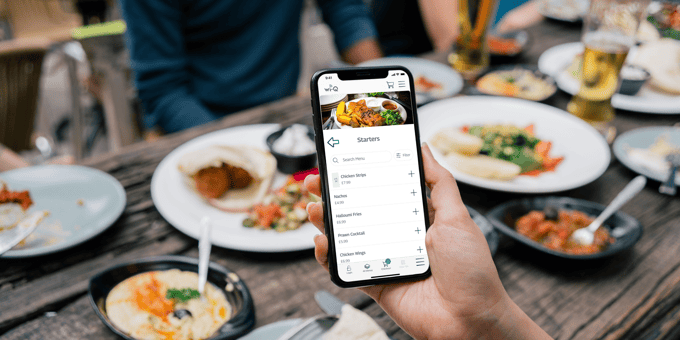As dietary preferences continue to evolve, food and beverage teams are having to quickly adapt to meet the diverse demands of today’s consumers. From the rise of plant-based diets and healthy eating to the prevalence of food allergies and intolerances, we explore the shifting landscape of the global food and drink industry.
Let's take a closer look at the top 3 evolving food and beverage trends and their impact on hospitality businesses across the world. Discover how restaurants and hotels are transforming their operations and menus to accommodate the rapidly changing future of dining.

How is the food and drink industry evolving?

1. Rise of allergies and intolerances
Recent data estimates that up to 10% of the global population has a food allergy, and the rates appear to be increasing - according to Food Insight.
This increase has led to the food and drink industry becoming increasingly influenced by concerns over allergens and intolerances and has heightened the need for better allergen management, labelling and alternatives. Disclosing calorie and allergen information is now a legal requirement for hospitality businesses across many countries.
2. Increased plant-based demand
The global plant-based retail market size is set to more than double by 2030 - according to the Bloomberg Intelligence report.
Whether it’s for health reasons, environmental sustainability, or animal welfare, more and more people are adopting a plant-based diet. With more readily available plant-based food and drink options, hospitality businesses are being forced to revisit their offerings for vegans and vegetarians.
3. Surge in health-consciousness
62% of Britons have recently altered their diet to get healthier - according to the British Nutrition Foundation survey.
In today’s digital era, people are more aware of what they are consuming due to the increased accessibility to nutritional and calorie information online. Social media influencers are also having a significant impact on shaping consumer choices regarding healthy food. This increasing demand for healthier food is steering restaurants to explore lower-calorie options for their diners.

How are these trends impacting food and beverage teams?

Menu diversification
As the rise of allergens, healthy eating and plant-based diets continue to soar, hospitality businesses are feeling the pressure to quickly adapt and include new options on their menus to make sure they stay competitive. Chefs are having to expand their menus and create new dishes that cater to the diverse dietary requirements of today’s consumer, including vegan, vegetarian and gluten-free. This menu expansion increases the complexity of managing dishes, stock and costs for staff.
Additional labour and costs
Updating menus with nutritional and allergen information can be extremely time-consuming for restaurants and hotels, especially if you are introducing a wide range of menu items to satisfy customer demands. Sourcing new ingredients to cater for various dietary requirements can also be expensive for hospitality businesses, with some ingredients costing even more than conventional options.
Increased responsibility
Hospitality businesses are seeing an increased responsibility for the safety and satisfaction of customers with food allergies or special dietary requirements. Food and beverage teams are required to ensure that common allergens are present and clearly displayed for each menu item and take measures to avoid cross-contamination in food preparation. These stricter regulations heighten the need for transparency in labelling and are shaping how businesses operate and communicate with their customers, both digitally and verbally.
Intensive staff training
Hospitality businesses must ensure that their staff receive extensive training on allergens and food preparation. Training staff to deal with allergens and calories is critical to ensuring the safety and satisfaction of customers with food allergies or special dietary requirements, as well as handling customer queries.
Need for new digital tools
Restaurants and hotels could be missing out on huge revenue-boosting opportunities if they are not utilising the right digital tools to meet consumer demands. At wi-Q, the digital menu is at the heart of our platform and plays a pivotal role in providing a flexible and convenient solution for hospitality businesses in response to the changing technology trends in today’s food and beverage industry.

What role does the digital menu play in this shift in consumer behaviours?
The pandemic accelerated the world’s digital transformation and deployment of contactless solutions in hospitality. Today, technology is reshaping our dining experiences and changing the way people engage and interact with food and beverage services. From online ordering to personalisation, the continuous tech evolution and growing consumer expectations are creating new challenges, but also new opportunities in hospitality.

User convenience
The acceleration in technology over the last few years has seen the arrival of a new digital consumer that values the convenience that digital menus provide, enjoying the easy user-friendly experience and flexibility to browse the menu in their own time.
Up-to-date information
With a digital menu management system, food and beverage teams can quickly and easily edit and update their online ordering platform to reflect any changes in ingredients or pricing. This not only provides the most up-to-date information for their customers online, but also delivers real-time communication for internal teams as well.
Customisable features and clear labels
A digital menu is a great solution for hospitality businesses to clearly display nutritional and manage calorie information online and offer customisable filters for allergen-free items and dietary requirements. This allows customers to search by their own preferences and identify any dishes that meet their needs, providing a more personalised online ordering experience that boosts customer satisfaction.

So what's next for the food and beverage industry?
With the rise of allergies and intolerances and increased demand for healthier options and plant-based food and drink, the digital menu plays a bigger role than ever before in the evolving food and beverage sector. By having an online ordering solution, hospitality businesses can face these new challenges by easily accommodating varying dietary requirements, managing allergens, and relieving additional workloads.
To stay competitive in the evolving market of food and drink, it is essential that hotel and restaurant businesses stay agile, welcome new technologies, and adapt their operations to cater to the changing expectations of the digital consumer.
Want to see our online mobile ordering solution in action? Get in touch to find out how our digital menu can help your food and beverage team save time and money.